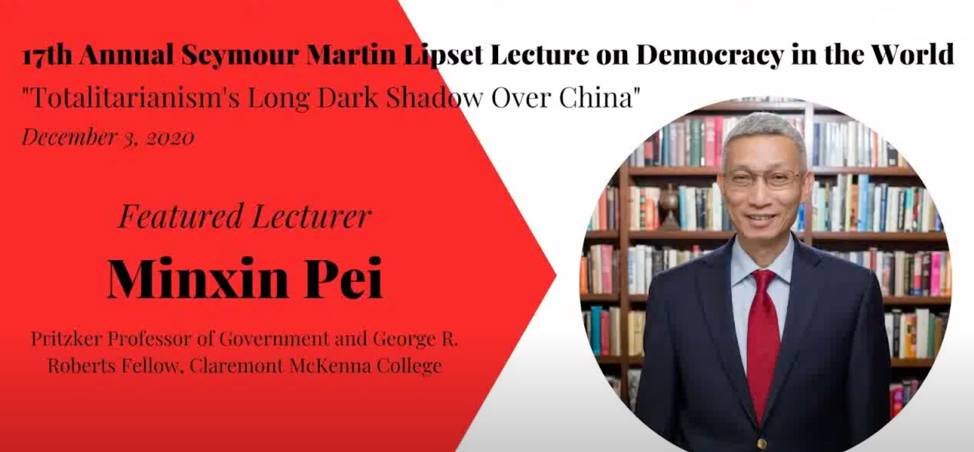Every year, the National Endowment for Democracy (NED) and the Embassy of Canada host the Martin Lipset Lecture on Democracy in the World. On December 3rd, 2020 they hosted their seventeenth edition of the lecture featuring Dr. Minxin Pei of Claremont McKenna College. Dr. Pei presented a lecture titled “Totalitarianism’s long dark shadow over China”, summarizing the recent history of the Chinese Communist Party and the rise of President Xi Jinping.
The talk began with an introduction from Minister Martin Loken of the Embassy of Canada to the United States, followed by remarks from NED President Carl Gershman. The hosts then presented a short video on the legacy of the lecture’s namesake, Dr. Seymour Martin Lipset. Described by some as the “grandfather of modernization theory”, Dr. Lipset’s legacy has profoundly influenced modern Western political thought and American exceptionalism. Following the video, Dr. Pei began his lecture streaming from Claremont McKenna College.
Dr. Minxin Pei is the Pritzker Professor of Government and George R. Roberts Fellow at Claremont McKenna College. He opened his lecture with Dr. Lipset’s modernization theory: as a country modernizes economically, it should eventually gain a democratic government. He postulated that this theory can apply to the People’s Republic of China, despite its economic prosperity and retainment of authoritarian political system. Dr. Pei noted that Chinese Communist Party (CCP) is unique for three reasons: the party preserved the core totalitarian institutions in the post-Mao era, pursued policies to prevent the free market from democratizing the political system, and enforced social control with the aid of hi-tech, such as big data and facial recognition, to bar group formation. However, he argued that by 2035 when China’s strongman Xi Jinping is likely to exit the political scence, China’s socioeconomic conditions will be far more favourable for democratization.

The 17th Seymour Martin Lipsey Lecture by Dr. Minxin Pei
During the Deng Xiaoping era, there was no formal term limit on any main political position except the president. Xi Jinping removed the limit in 2018, allowing for what Dr. Pei described as a rejuvenation of Neo-Stalinism. That being said, his research noted cracks in President Xi’s policies. Factors such as the Belt and Road Initiative, repression in Hong Kong, and Uyghur detainment in Xinjiang would ultimately weaken the party’s hold on party and endanger its survival. He concluded that the dark shadow of totalitarianism over China will eventually disappear and democratization will likely follow.
NED director Shanthi Kalathil led the question and answer portion of the lecture. She asked Dr. Pei how his opinions have evolved over the course of his profession. Dr. Pei stated that he began his work as a true believer in economic reform for political change. In the 1990s, however, political reform in China slowed and by the 2000s, he found that the CCP had “no interest” in renewing political reforms. Dr. Pei said that, while he still believed in economic reform, he realized that it would be a much more difficult process over time. Still, he articulated optimism over recent developments in the pandemic. When Dr. Li Wenliang, the first doctor to warn the public about Covid-19, passed away, citizens criticized the government over social media and even on some news media channels. This shows that in spite the intense repression under Xi, civil society has survived and remains resilient.

Q&A session with Dr. Pei moderated by Shanthi Kalathil
The 2020 Seymour Martin Lipset Lecture provoked interesting discussions surrounding totalitarianism and the pandemic. Dr. Minxin Pei’s argument relied on Lipset’s modernization theory to claim that the present Chinese state has three unique methods of maintaining political power. He made several political predictions followed by a Q&A session. Ultimately, he concluded that economic modernization would eventualize in political change.
Elizabeth Shaw is an event reporter and contributor for the East Asia section of Synergy. a fourth-year double major in Peace, Conflict and Justice and Contemporary Asian Studies. She enjoys learning, researching, and writing about various topics surrounding Asia, including gender and migration and social movements.








